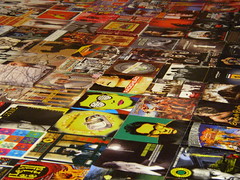When the call comes: ways of bulk ripping a CD collection
November 06, 2011 in digital music by Dan Gravell

You know the type of phone calls...
Hello, it's me, how are you? Yes, your mum and I are fine. Anyway I wondered if you could help us with this problem with the computer...
All families seem to have de facto tech support. Often it's the younger members of the family and it involves removing the latest virus your parents managed to 'contract', showing them how to add memory or what-not.
Well, for a slightly more interesting twist on things, what if the request for help was more computer audio oriented?
Home music networks have grown in popularity over the past five year. Vendors like Sonos, Logitech and, of course, Apple have succeeded in growing a userbase for their home digital music systems. At the higher end audiophile manufacturers are making successful moves into computer audio. And this means, sooner or later, the call comes to help with the transition from CD to MP3 (or FLAC, preferably).
If you're unlucky, you'll probably be involved in the decision as to which system to purchase. Forgive my cynicism, but there's no correct answer to this question, and you know that sooner or later some deficiency will be casually mentioned with the expectation of yet more technical miracles to come.
Probably more interesting is helping with the transfer from CD audio to computer audio. Given my posts about CD ripping in the past you would probably expect me to say "just get on and do it!". But there are more options than that. What are three ways of ripping your parent's CDs to computer audio?
Do-it-yourself
The most obvious approach, particularly if you read this blog. Once you learn about computer audio and have a play with CD ripping it seems that you could rip your parent's entire collection. Don't forget, of course, that it's not just the ripping: you'd better get that metadata cleaned up and cover art downloaded and installed!
Theoretically you can get by with a computer with a CD drive, some free ripping software and an Internet connection, but there's also both hardware and software that can make the process much faster. Robotic CD loaders can be loaded with many CDs at once, removing the need to change CD one after the other. And, of course, bliss can be used to tidy up all that metadata and find all that album art in an automated fashion.
I'd go so far as to say for an average collection of 400 CDs or more these automated tools become essential. Each CD takes, say, five minutes to rip, then on average 30 seconds to tidy any metadata quirks, then another minute (on average) to find and install the album art (remember to embed and also remember some music players have specific sizing rules). So six and a half minutes per CD... that's almost two days of continuous ripping! Unless you are an insomniac how will you find that time?
There's also the question of expertise. Forget the simple matter of whether you've ripped a CD before, but the requirements of the music player have to be taken into account too. Do you know, for instance, whether multiple genres are allowed in this new system? Is FLAC even supported? The last thing you want, having spent two days ripping, is to find you need to re-rip.

Hire a student
... or anyone with time on their hands ;-)
This is really an outsourced version on the DIY approach. Advertise in the local shop/college/University, drop the CDs around, and go back a few days later to pick up your freshly ripped computer audio.
That's the best case scenario anyway. It certainly saves some time. However, the question of expertise in the particular music system is still outstanding.
And I won't lower myself to stereotypes but... you know.
Pay the professionals
I didn't realise this until a year or so ago, but it turns out there are professionals who actually do the CD ripping for you. It probably didn't occur to me because my computer audio collection has been built slowly, ripping a few CDs at a time. When you consider use cases of hundreds or thousands of CDs, however, it makes a lot of sense.
An example of this service is dmp3 Music, who are based in the 'States and also serve Canada. They send a shipping pack to you, which is a way of securely packing all your CDs, you send back the packed CDs and a few days later your computer audio is delivered back to your door (with your original CDs, of course!). They also do all the metadata-cleaning and album-art-downloading for your entire collection. I've been working with them on some new ideas for bliss to help in their industrial-scale CD ripping. Check them out!
Deciding whether to pay a CD ripping company to transfer a CD collection is a classic time or money quandry. Yes, it costs more money, but the time savings are vast. In fact, because they tend to employ specialised hardware to parallelise and speed up the ripping the total elapsed time of the rip is probably faster than you can manage too... including shipping!
Also, because it's their job, you know that a CD ripping company understand the nuances of ripping and metadata cleaning. Most importantly, you don't have to account for having to re-rip CDs when you get it wrong, which is an added time cost.
But best of all? You can obviate responsibility when another one of those phone calls occurs... ;-)
Remember there's more than one way to rip a large CD collection!
Thanks to Daveybot and Todd Binger for the images above.

